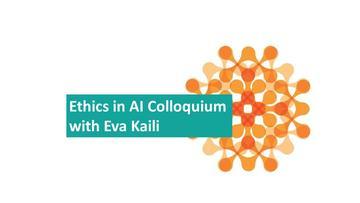Ethics in AI Colloquium with Eva Kaili: The EU proposal for an AI regulation: a step towards a responsible global AI framework

Ethics in AI Colloquium - presented by the Institute for Ethics in AI
Live Event: Thursday 28 October 2021, 5.00pm -6.15pm
In person - venue details to be announced here
The Institute for Ethics in AI will bring together world-leading philosophers and other experts in the humanities with the technical developers and users of AI in academia, business and government. The ethics and governance of AI is an exceptionally vibrant area of research at Oxford and the Institute is an opportunity to take a bold leap forward from this platform.
Every day brings more examples of the ethical challenges posed by AI; from face recognition to voter profiling, brain machine interfaces to weaponised drones, and the ongoing discourse about how AI will impact employment on a global scale. This is urgent and important work that we intend to promote internationally as well as embedding in our own research and teaching here at Oxford.
This conversation will focus on the EU AI regulatory environment after the EU Commission's AI act proposal, as well as analysing the EU AI ethical principles in relation to the global context.
Speakers:

Eva Kaili is a Member of the European Parliament, part of the Hellenic S&D Delegation since 2014. She is the Chair of the Future of Science and Technology Panel in the European Parliament (STOA) and the Centre for Artificial Intelligence (C4AI), Member of the Committees on Industry, Research and Energy (ITRE), Economic and Monetary Affairs (ECON), Budgets (BUDG), and the Special Committee on Artificial Intelligence in a Digital Age (AIDA).
Eva is a member of the delegation to the ACP-EU Joint Parliamentary Assembly (DACP), the delegation for relations with the Arab Peninsula (DARP), and the delegation for relations with the NATO Parliamentary Assembly (DNAT).
In her capacity, she has been working intensively on promoting innovation as a driving force of the establishment of the European Digital Single Market. She has been the draftsperson of multiple pieces of legislation in the fields of blockchain technology, online platforms, big data, fintech, AI and cybersecurity, as well as the ITRE draftsperson on Juncker plan EFSI2 and more recently the InvestEU program.
She has also been the Chair of the Delegation to the NATO PA in the European Parliament, focusing on Defence and Security of Europe.
Prior to that, she has been elected as a Member of the Hellenic Parliament 2007-2012, with the PanHellenic Socialist Movement (PASOK).
She also worked as a journalist and newscaster prior to her political career.
She holds a Bachelor degree in Architecture and Civil Engineering, and Postgraduate degree in European Politics.

Carly Kind is the Director of the Ada Lovelace Institute, an independent research institute and deliberative body a remit to ensure data and AI work for people and society. A human rights lawyer and expert in technology policy, Carly has advised industry, government and non-profit organisations, and worked with the European Commission, the Council of Europe, numerous UN bodies and a range of civil society organisations. She was formerly Legal Director of Privacy International, an NGO dedicated to promoting data rights and governance.
In addition to her role at Ada, Carly is the Chair of the UKRI Trustworthy Autonomous Systems Hub Board, the Acting Chair of the online abuse charity Glitch, and the civil society representative on the Steering Committee of the Global Partnership on AI.

Jeremias Adams-Prassl is Professor of Law at Magdalen College in the University of Oxford. He studied law at Oxford, Paris, and Harvard Law School, and is particularly interested in the future of work and innovation. Jeremias is the author of numerous articles and books, including most recently Humans as a Service: the Promise and Perils of Work in the Gig Economy (OUP 2018) and Great Debates in EU Law (MacMillan 2021). His work has been recognised by prizes for teaching, research, and public impact, including the Modern Law Review’s Wedderburn Prize, a British Academy Rising Star Engagement Award, and the 2019 St Petersburg Prize. Since April 2021, he has lead a five-year research project on Algorithms at Work, funded by the European Research Council and a 2020 Leverhulme Prize. Jeremias tweets at @JeremiasPrassl.

Chaired by John Tasioulas, the inaugural Director for the Institute for Ethics and AI, and Professor of Ethics and Legal Philosophy, Faculty of Philosophy, University of Oxford. He was previously the inaugural Chair of Politics, Philosophy & Law and Director of the Yeoh Tiong Lay Centre for Politics, Philosophy & Law at The Dickson Poon School of Law, Kings College London. Professor Tasioulas has degrees in Law and Philosophy from the University of Melbourne, and a D.Phil in Philosophy from the University of Oxford, where he studied as a Rhodes Scholar. He was previously a Lecturer in Jurisprudence at the University of Glasgow, Reader in Moral and Legal Philosophy at the University of Oxford, where he taught from 1998-2010, and Quain Professor of Jurisprudence at University College London. He has also acted as a consultant on human rights for the World Bank and is a member of the International Advisory Board of the European Parliament's Panel for the Future of Science and Technology (STOA). He has published widely in moral, legal, and political philosophy.
Find out more about the full Institute for Ethics in AI programme here.




